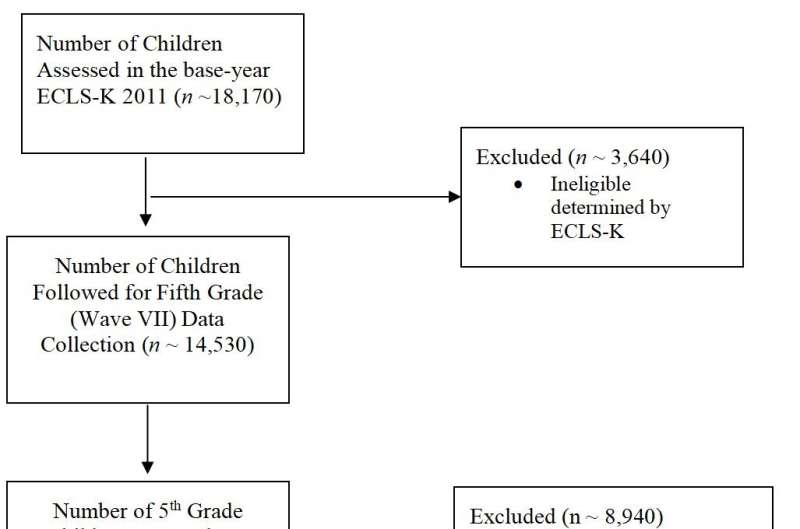This article has been reviewed according to Science X's editorial process and policies. Editors have highlighted the following attributes while ensuring the content's credibility:
fact-checked
trusted source
proofread
Public health insurance for parents improves children's reading skills, study finds

A recent series of three papers authored by Caitlin Lombardi demonstrate the effects of publicly funded health insurance for parents on three different metrics of children's health and development. The newest, published in Southern Economic Journal, highlights a significant boost to children's reading scores when their parents gain healthcare coverage.
"It was very exciting to find that result," says Lombardi, an assistant professor in the Department of Human Development and Family Sciences (HDFS). "In general, these papers and much of my research looks at how policies, at both the state and federal levels, can impact children's development and their parents' and families' well-being. And some of these [impacts] are indirect."
Lombardi's previous work on health and education policy (under former Vermont U.S. Senator Patrick Leahy) led her to the field of human development and family sciences. At UConn, she is researching the effects of some of the policies she worked on while staffing the Senate.
When she worked in the federal government, Lombardi heard from thousands of constituents about health insurance—including families who had been thrown into financial ruin by medical bills that far outstripped their limited or nonexistent coverage. The work revealed the necessity of expansions to the public health insurance system, she says.
This was back in 2008; in 2014, Medicaid coverage was expanded under the Affordable Care Act (ACA, sometimes known as "Obamacare"). While individual states could choose whether or not to adapt to the new policy, many, including Connecticut, embraced the ACA's provisions. This meant that many Connecticut residents whose income had exceeded the previous cutoff threshold for public health insurance were now eligible for coverage.
Lombardi and her collaborators report that children whose parents became newly eligible for Medicaid coverage under the ACA demonstrated approximately 2.3% higher reading scores than children from similar economic circumstances who lived in states where Medicaid eligibility was not expanded.
More targeted policies, such as in-classroom reading interventions and expanding healthcare coverage for children themselves, typically result in about twice that increase in reading scores, according to Lombardi. Still, as a side effect of the ACA—a policy with no stated aims to improve children's literacy—this finding is revelatory for family science and public policy researchers.
Other papers in this series of three studies, on which Lombardi collaborated with Lindsey Rose Bullinger at Georgia Tech and Maithreyi Gopalan at Penn State, analyze the effects of expanded Medicaid coverage on families' health-related financial well-being and on parent and child health outcomes. Children's reading skills may seem less intrinsically linked to parental health insurance, but, Lombardi points out, this analysis highlights the positive ripple effects of the policy beyond its intended aims.
Households where parents became eligible for public health insurance under the ACA "spent more time reading at home and more time eating dinner together," Lombardi says, which may have indirectly translated to a boost in reading skills.
The other mechanism that researchers identify is less parental help with homework, highlighting the importance of late elementary schoolers' academic independence.
"It might make sense that more parental time with homework is better for children, but at this particular age—these children are now around 4th and 5th grade—this is when children's expected independence and autonomy in relation to their homework really develops," Lombardi explains.
"Being able to receive an assignment from their teacher and come home and, with some structure in place at home, be able to complete that with less direct help and monitoring by parents than with younger elementary school students. This is expected as they're preparing for middle school and eventually high school."
The researchers also point to an important phenomenon known as the "welcome mat effect," where increased health coverage for adults indirectly leads to more children receiving coverage. While the ACA only applied to adults (child health insurance coverage was previously expanded under a separate program, CHIP), more children were nonetheless enrolled in public insurance plans after its passage.
This may be because the ACA made it simpler for parents to enroll in their own coverage, providing a "welcome mat" to the world of public insurance and thus streamlining the process of enrolling their children, according to Lombardi. Another likely explanation is that the ACA lessened financial burdens on low-income families overall, enabling them to invest more in preventative health services for both parents and children.
As the health insurance system continues to evolve, shaped by public advocacy and fierce policy debate, research in HDFS will remain crucial in interpreting its effects on children and families in Connecticut and across the country.
More information: Lindsey Rose Bullinger et al, Impacts of publicly funded health insurance for adults on children's academic achievement, Southern Economic Journal (2022). DOI: 10.1002/soej.12614




















